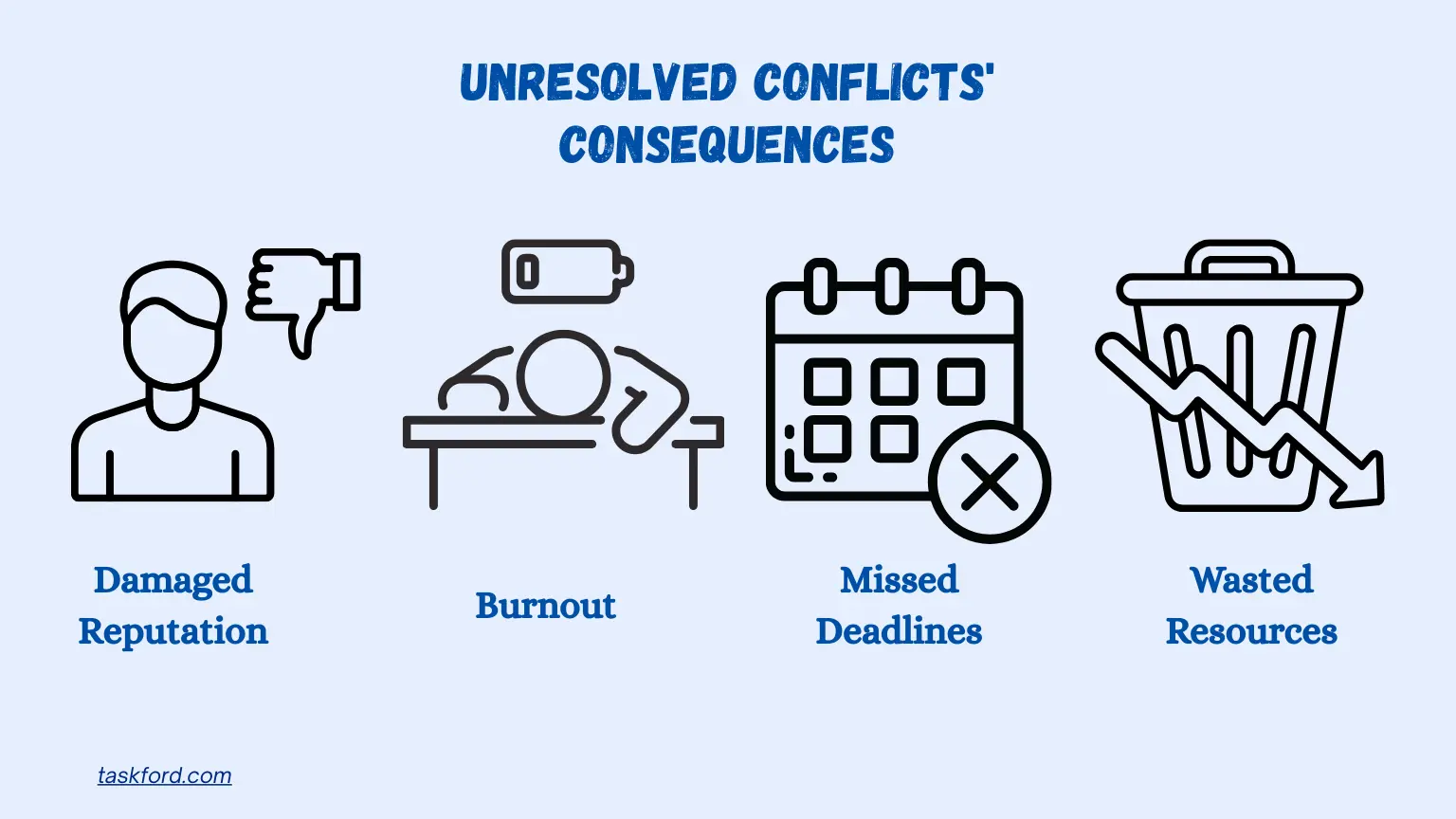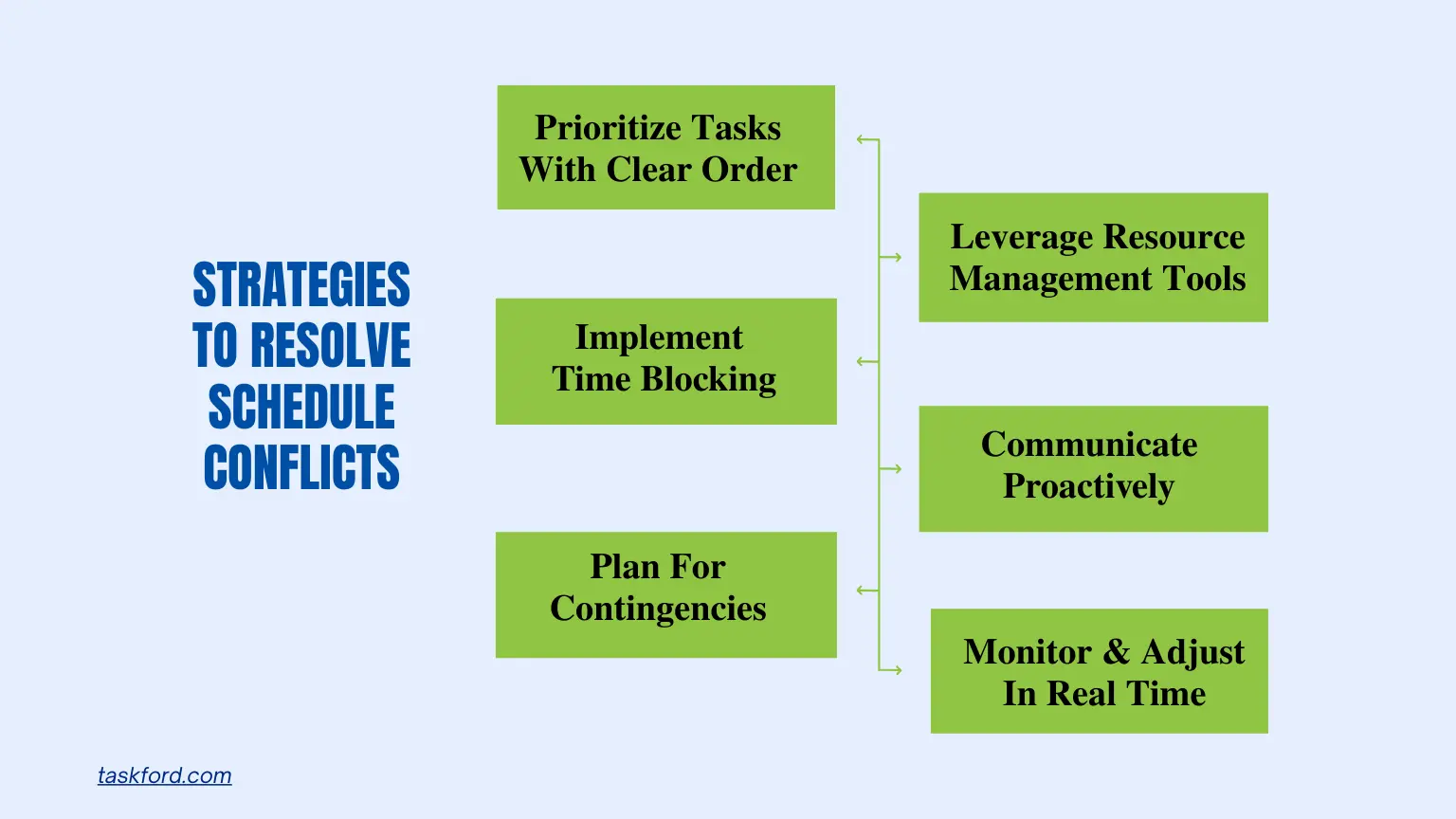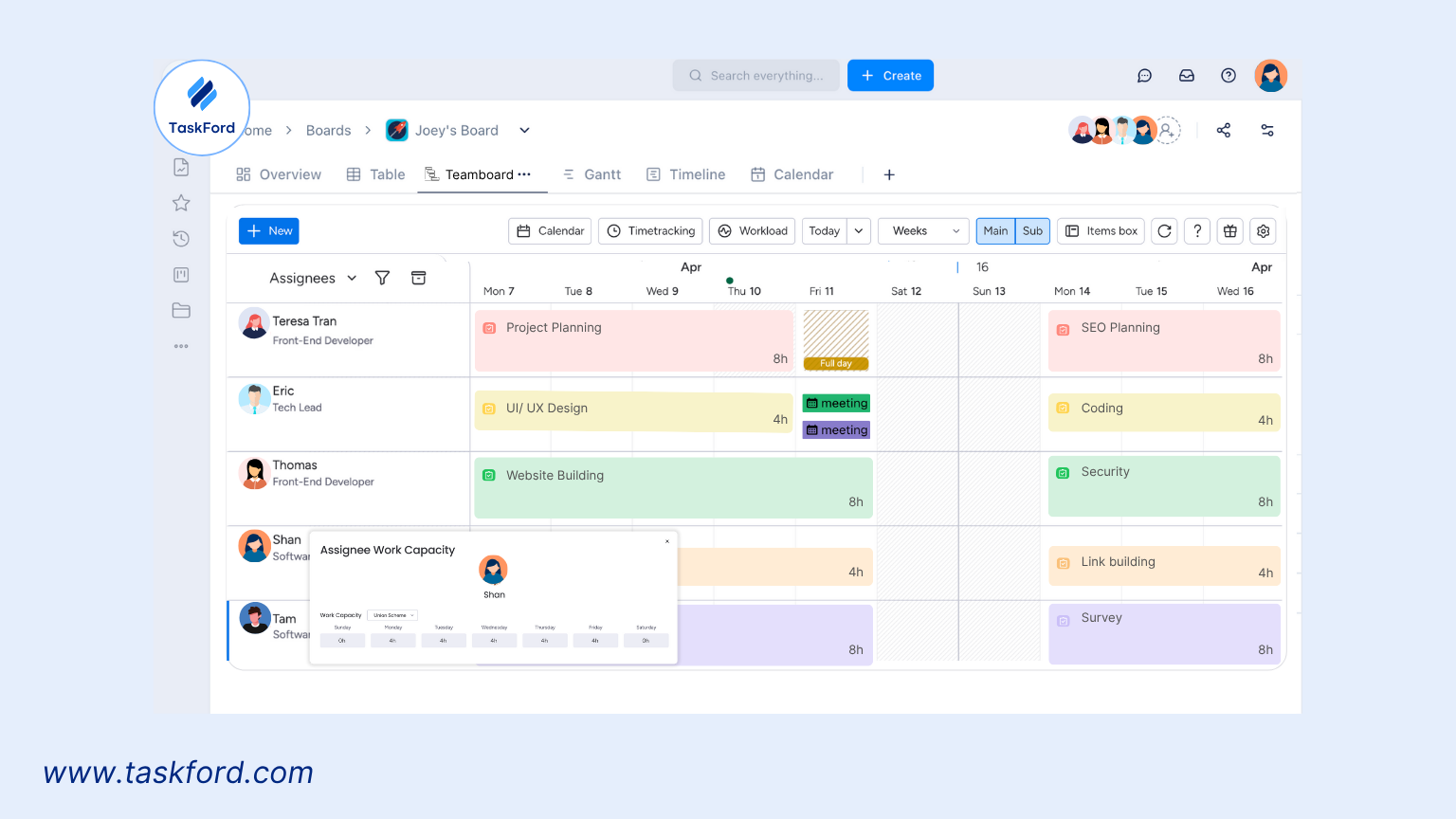Clashing Priorities? Here's How to Solve Schedule Conflicts
Discover practical strategies to resolve schedule conflicts and optimize resource management for smoother project delivery.
Managing a team or project often feels like assembling a complex puzzle where the pieces, your team members, tasks, and deadlines, don't always fit neatly together. Schedule conflicts arise when priorities compete for the same resources, time slots, or attention, creating bottlenecks that can derail even the most carefully laid plans. Whether you're juggling overlapping meetings, overbooked team members, or competing project deadlines, resolving these conflicts requires a strategic approach rooted in effective resource management.
In this blog, we'll dive deep into practical strategies to address scheduling conflicts, explore the role of resource planning, and highlight how TaskFord's tools can help you navigate these challenges with precision.
What Is Resource Planning?
Resource planning is the process of allocating and managing resources, such as people, time, tools, and budgets, to achieve project goals efficiently. It involves forecasting needs, assessing availability, and assigning resources to tasks while balancing workloads and avoiding conflicts. Effective resource planning ensures that the right resources are available at the right time, minimizing delays and maximizing productivity.
At its core, resource planning answers critical questions:
- Who is available to work on this task?
- What tools or equipment are needed?
- How much time is required to complete the project?
By planning resources, you can prevent conflicts before they arise. For a deeper dive, read our detailed guide on Resource Planning
Understanding Schedule Conflicts: Why They Happen
Schedule conflicts occur when two or more tasks, meetings, or priorities demand the same resources, whether that's an employee's time, a meeting room, or critical equipment, at the same moment. These clashes often stem from:
- Overlapping Deadlines: Multiple projects with tight timelines compete for the same team members or tools.
- Poor Resource Allocation: Assigning tasks without considering team members' existing workloads or availability.
- Unclear Priorities: When team members or managers aren't aligned on what takes precedence, conflicts emerge.
- Unexpected Changes: Last-minute client demands, sick leaves, or equipment failures can throw schedules into disarray.
- Communication Gaps: Lack of visibility into team schedules or project dependencies leads to double-booking or missed deadlines.
These issues don't just disrupt productivity; they can erode team morale, increase stress, and damage client relationships. The good news? With the right strategies and tools, you can resolve schedule conflicts and keep your projects on track.
The Cost of Unresolved Schedule Conflicts

Ignoring schedule conflicts can have ripple effects across your organization. Here's what's at stake:
- Missed Deadlines: Overlapping tasks can delay deliverables, frustrating clients and stakeholders.
- Burnout: Overworked team members juggling conflicting priorities may experience stress and reduced performance.
- Wasted Resources: Time spent resolving conflicts or redoing work due to miscommunication eats into budgets.
- Damaged Reputation: Consistent scheduling mishaps can signal unreliability to clients or partners.
Effective resource management is the antidote. By proactively addressing conflicts, you can optimize your team's time, reduce stress, and ensure projects stay on course.
Strategies to Resolve Schedule Conflicts

Here are actionable steps to tackle schedule conflicts, grounded in resource management principles:
1. Prioritize Tasks with a Clear Hierarchy
Not all tasks are created equal. When conflicts arise, a clear prioritization framework helps you decide what takes precedence. Use these methods:
- Eisenhower Matrix: Categorize tasks by urgency and importance. Focus on what's urgent and important first, delegate or defer less critical tasks.
- Weighted Scoring: Assign numerical values to tasks based on factors like revenue impact, client priority, or strategic goals. For example, a high-value client deliverable might outweigh an internal meeting.
- Stakeholder Input: Consult key stakeholders to align on priorities, ensuring everyone agrees on what matters most.
Pro Tip: Document your prioritization criteria and share them with your team to avoid confusion and ensure alignment.
2. Leverage Resource Management Tools
Manual scheduling via spreadsheets or emails is a recipe for errors. Modern resource management tools like Asana, ClickUp and TaskFord provide real-time visibility into team availability, project timelines, and resource allocation. These platforms allow you to:
- Track Availability: See who's available and who's overbooked at a glance.
- Identify Bottlenecks: Spot resource conflicts before they escalate.
- Adjust Schedules Dynamically: Reassign tasks or reschedule meetings with user-friendly functionality.
By centralizing scheduling data, you reduce the risk of double-booking and ensure resources are allocated efficiently.
3. Implement Time Blocking
Time blocking involves reserving specific time slots for high-priority tasks or projects, reducing the likelihood of conflicts. For example:
- Dedicated Project Hours: Assign uninterrupted hours for critical tasks, such as coding or creative work.
- Buffer Times: Build buffers between meetings to account for overruns or unexpected delays.
- No-Meeting Days: Designate days for focused work, minimizing the chance of scheduling clashes.
Time blocking not only prevents conflicts but also enhances productivity by giving team members uninterrupted focus.
4. Communicate Proactively
Many schedule conflicts arise from miscommunication or lack of visibility. Foster a culture of transparency by:
- Regular Check-Ins: Hold brief stand-up meetings to discuss upcoming tasks and potential conflicts.
- Shared Calendars: Use tools like TaskFord to maintain a centralized calendar visible to all team members.
- Conflict Resolution Protocols: Establish clear steps for resolving clashes, such as escalating to a manager or using a first-come, first-served rule.
Encourage team members to flag conflicts early, allowing you to address them before they snowball.
5. Plan for Contingencies
Unexpected events, sick days, equipment failures, or urgent client requests, can disrupt even the best schedules. Build flexibility into your plans:
- Resource Buffers: Avoid scheduling team members at 100% capacity. A 10-20% buffer allows room for unexpected tasks.
- Backup Resources: Identify alternative team members or equipment that can step in if needed.
- Scenario Planning: Anticipate potential conflicts, such as holiday seasons or product launches, and create contingency plans.
By preparing for the unexpected, you can mitigate the impact of disruptions.
6. Monitor and Adjust in Real Time
Schedules aren't set in stone. Regularly review your team's workload and project progress to catch conflicts early. Use resource management software to:
- Track Workload Balance: Ensure no team member is overloaded while others are underutilized.
- Analyze Performance: Identify recurring conflicts to improve future planning.
- Reallocate Resources: Shift tasks or deadlines based on real-time data.
Continuous monitoring allows you to adapt to changing priorities and keep projects on track.
The TaskFord Advantage: Managing Schedule Conflicts with Precision

TaskFord is a project and resource management platform designed to help teams allocate resources, track project progress, and manage schedules effectively. Here's how TaskFord's real features help you resolve schedule conflicts:
- Resource Capacity Planning: TaskFord allows you to view team members' availability and workload in real time, helping you avoid overbooking and allocate tasks based on capacity.
- Project Scheduling: Create and manage project timelines with a clear overview of tasks, deadlines, and dependencies, reducing the risk of scheduling overlaps.
- Centralized Dashboard: Access a unified view of all projects, resources, and schedules, enabling quick identification and resolution of conflicts.
- Task Management: Assign tasks to team members based on their skills and availability, with alerts for potential conflicts.
- Time Tracking: Monitor how team members spend their time to ensure balanced workloads and identify overcommitted resources.
TaskFord's user-friendly interface and robust features empower project managers, team leads, and small business owners to optimize resource allocation, balance workloads, and deliver projects on time.
Best Practices for Long-Term Conflict Prevention
While resolving conflicts is critical, preventing them in the first place is even better. Here are long-term strategies to keep your schedules conflict-free:
- Standardize Scheduling Processes: Create templates or guidelines for scheduling tasks and meetings to ensure consistency.
- Train Your Team: Educate team members on using resource management tools and spotting potential conflicts early.
- Review Historical Data: Analyze past projects to identify patterns, such as frequent overbooking during certain seasons, and adjust planning accordingly.
- Foster a Collaborative Culture: Encourage open communication and accountability to minimize misunderstandings.
By embedding these practices into your operations, you can reduce the frequency and severity of schedule conflicts over time.
Conclusion: Take Control of Schedule Conflicts Today
Schedule conflicts are an inevitable part of managing teams and projects, but they don't have to derail your success. By prioritizing tasks, leveraging resource management tools, communicating proactively, and planning for contingencies, you can resolve conflicts efficiently and keep your projects on track.
Ready to take control of your schedule? Sign up for TaskFord today and discover how our resource management solutions can help you eliminate conflicts and deliver projects with confidence.
Learn more
- Crafting a Resource Management Plan: A Project Manager's Handbook
- Contingency Planning in Project Management: How to Stay on Track When Things Don’t Go as Planned
- Lack of Resources? 7 Smart Ways to Deliver Results Anyway
Making work simpler,
smarter, and more connected
Join our waitlist and be notified first.

Related Blog
Subscribe for Expert Tips
Unlock expert insights and stay ahead with TaskFord. Sign up now to receive valuable tips, strategies, and updates directly in your inbox.






